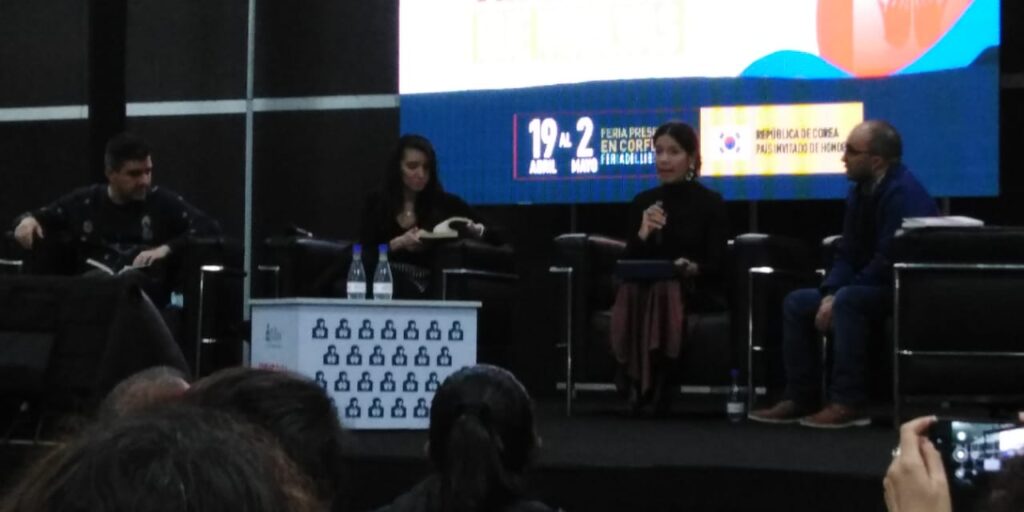Three journalists tell very different stories, all of which are both moving and shocking.

FILBo has, literally, tons of books. How many are sold every year? That’s for the post-show statistics to show. But, it is the narratives which give FILBo its character, especially when we get to hear directly from the players themselves. Last Saturday, I headed to Corferias with a hunger for stories. Journalists Juan Pablo Barrientos, Diana López Zuleta, and Pablo Navarrete gave us a glimpse of the painful, mostly unknown stories they have put into words. How and why did they decide to write about a story of paedophilia, a father’s murder, and the unknown sister to Carlos Pizarro, M19 guerrilla commander, respectively?
Diana López Zuleta: Lo que no borró el desierto – What the Desert did not Take Away
Diana López has been struggling since she was 10 years old to discover the reasons for her father’s murder. Her book is the result of a dialogue with herself, and an investigation into what happened. She reckons this book has grown up alongside her. But it was only when she had the proper investigative tools that she could make it a reality. Writing it helped her finally close the grief cycle, something she couldn’t do before because of the impunity of her father’s killer.
López says the title of the book is a homage to her father; she says his death was heart wrenching. “It was usual to be in school” in Barrancas, Guajira, “and receive the news that your mom or dad had been killed” she recounts. She doesn’t remember much of the day, most of her account she had to draw from videos and interviews she collected. It’s shocking to hear her tell that her father’s killer was cynical enough to show up at the wake and read a plagiarized eulogy.
Juan Pablo Barrientos: Este es el cordero de Dios – The Lamb of God
Juan Pablo Barrientos had already written one book about the number of paedophilia cases in Colombia. Entitled Dejad que los niños vengan a mí, the name comes from a bible quote “Let the little children come to me…” A while after the book was published, he got an anonymous message on Twitter telling him 19 priests had been suspended in the Archdiocese of Villavicencio for paedophilia. His journalistic gut told him there was something there to investigate and report. His one and only conversation with the Archbishop there confirmed the tweet was true.
Barrientos travelled to Villavicencio to talk to Pedro*, whose name has been changed to protect his identity. Now a man, as a child Pedro had been both molested and introduced to prostitution by 30 priests. He also talked to the two women who uncovered this horrible story. Publisher Planeta contacted Barrientos and made his news reports into a book. He is proud that his book is a homage to the two women. In his words, these faithful Catholics confronted the Archbishop and uncovered this prostitution network.
To hear Barrientos talk about priests who had a whip-around to have Pedro killed is gut-wrenching to say the least. The journalist openly accuses the Catholic church of being “a transnational organized crime group, mobsters.” In Barrientos’ words “Pedro is the lamb of god, a child who was mistreated, abused, and almost killed by the Catholic church.”
Pablo Navarrete: Nina Pizarro, la pirata blanca – Nina Pizarro, the White Pirate
Pablo Navarrete, was a family friend of Nina Pizarro. He and his family would usually visit Nina in Guayatá and he always wondered how someone who’d been involved in operations to steal weapons ended up marrying a military man. As a child, Navarrete would overhear stories of how Nina – Pizarro’s sister – had driven the truck on the day of the robbery. But this didn’t fit with the image the young Pablo had formed. So he decided to investigate now and tell the story of Nina.
Navarrete wanted to focus on Nina´s story without actually connecting her to her brother or her brother’s story. Nina loved building scale ships and that’s the reason the title is called The White Pirate. Nina was just 25 when she came back from France and became a member of the M19 guerrilla. Seven months pregnant, she directed the whole robbery operation; the person in charge of driving the truck did not show up and so she stepped in. She drove back and forth eight times between the military base and the groups’ hideout. She was eventually caught, interrogated, and imprisoned for a little over three years.
Without giving away any spoilers, hearing these writers talk adds another dimension to their accounts. All three of these painful unknown Colombian stories are worth reading. Barrientos closes the session by giving us more insights into the story of Pedro. The 13-year was working on the streets when a priest lured him in with the offer of new clothes. This priest not only abused him sexually, but also sent Pedro to other priests’ houses to offer them prostitution services. Barrientos says he’s discovered a pattern: priests in these dioceses look for boys who are poor, come from dysfunctional families, or boys who have been abandoned by their parents. They seduce them with clothes or money and have them provide sexual services.
There is still time to visit FILBo (May 2 is the last day) and listen to the authors themselves. Whether you’re Colombian or international, these types of stories can help us to understand the country more. And that knowledge may help to end these loops of violence.





